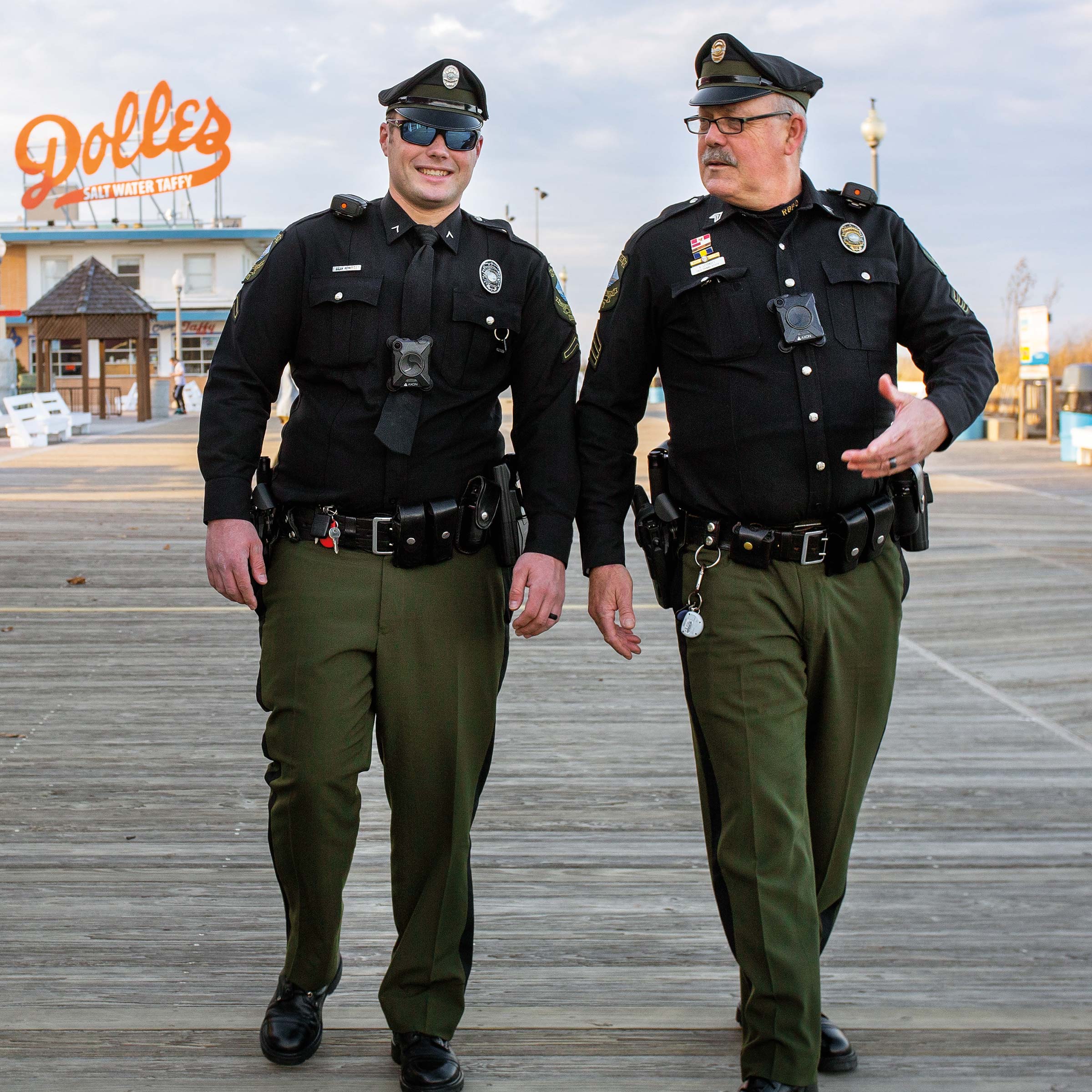
Even in a small resort town, there’s no vacation from misfortune and misbehavior
By Victor Letonoff Jr. | Photographs by Carolyn Watson
From the May 2020 issue

One sergeant reflects on the day-to-day challenges, sharing insights that might deepen the public’s understanding — and help new officers find their way in a demanding, sometimes confounding, career.
Dear Young Cop:
There’s so much I want to tell you and so very much I want for you: to serve without receiving injury; to end your career quietly after 20, 25 — even 40 — years with the knowledge that you have done your job well. I want you to be filled with pride every day that you put on your uniform, gun belt, ballistic vest (always wear your vest, young cop). Mostly, I want you to feel both awe and humility at what an honor it is to be a police officer.
But who am I to write this letter? I’m not a big city cop whose career was filled with drama: homicides, drug busts and high-speed chases. Instead, I’m a sergeant in a small Mid-Atlantic resort town with only three entrances into the city, one of them over an antiquated drawbridge. The ocean flanks one end of town along with an old-fashioned bandstand, where outdoor concerts are often held. Beyond that is a mile-long boardwalk, built in the early 20th century for patrons at the luxury hotels (so they wouldn’t carry sand into the elegant lobbies). The town, originally founded in 1873 as a Methodist church camp, is often described as quaint and upscale.
In the summer, however, this little burg explodes. Bumper-to-bumper traffic, fistfights over parking spaces, sidewalks thronged with tourists. Visitors bake on the beach, and the sand blisters feet. This is the environment in which I answer calls, wearing my heavy ballistic vest under a wool uniform. I trudge onto the beach to restrain a belligerent drunk or search for a lost child. I sweat so heavily that it soaks through the vest.
My colleagues and I long for summer’s end and the quiet that settles like a blanket of snow. As with the snow, though, there’s still plenty underneath, only it’s harder to discern. Long after the tourists leave, we still have our drug addicts, the mentally disturbed, the domestic abusers, and the drunks, always the drunks.
Although the scale is different, small-town cops see many of the same things that big city cops see. In fact, most police officers work for small departments. Of the nation’s nearly 18,000 police agencies, 90 percent employ fewer than 50 officers; of these, about half employ fewer than 10 officers, and nearly 1,000 departments have only one. In contrast, New York City has 36,000 officers. Still, we’re all dealing with human beings and their dreams and desires. People grow jealous and angry no matter where they live; they try to escape sorrow and disappointment with drugs and alcohol; they are fueled by greed and pain and want what they cannot have. These things don’t change because one lives in a big East Coast city or a rural Midwestern town or a vast county in the West.
Sadly, even my resort town, filled with affluence and beauty, has its rapes and the occasional homicide; there are burglaries and thefts, more so now with the opioid epidemic. I deal with pedophiles, the homeless, domestic assaults and more. Here, too, my experience isn’t unique from that of most cops. In fact, it isn’t that different from what a cop patrolling New York City streets in the mid-19th century experienced. From 1845 to 1853, more than a third of all arrests there (over 82,000) were for drunkenness. Flash-forward nearly 170 years, and drunkenness remains my primary complaint, as well.
Some things never change.
A muting of emotions
What makes my police department unique is our employment of seasonal officers. From November to May we have our 17 sworn full-time officers, and that’s fine: We have some busy days and nights during these months, but we’re not overwhelmed. When summer arrives, however, and the town sometimes swells to over 60,000 people, all crammed into an area not much bigger than one square mile, two or three officers handling such crowds would be unsustainable. Actually, it would be impossible. And so for over 100 years, our police force has been augmented by seasonal officers.
What I most appreciate about these young officers is their astonishment at what I regard as routine. They’re stunned, for instance, to encounter adults their parents’ ages — even their grandparents’ ages! — acting in a degrading manner. And that shock, naivete, disbelief — I wish I still had this. I don’t. Sometimes I think I’ve lost my capacity for surprise. It’s not that I judge, but when I have a 60-something woman so drunk that she bites — bites! — a stranger in a bar, and then, when the EMT is trying to get her into an ambulance to take her to detox, she kicks the EMT and urinates all over herself (and me), I’m not shocked; I’m not even fazed. And shouldn’t I be?
Of course.
The seasonal officers remind me of this: What I see day-in, day-out, is not the norm. And their astonishment — how can someone act like this? How does this happen to a person? — reminds me to be curious. Sometimes, I worry that I’ve lost this too.
Wonder, astonishment, curiosity: These are such important qualities. And yet, if my seasonal officers are to succeed in this career, they must acquire skills that will protect both their bodies and their hearts at such moments. As cops, we’re trained to protect ourselves physically, but there’s minimal education in how to protect our emotions. How does one remain compassionate and curious without becoming vulnerable to harm? It’s a balance I don’t always achieve. But in exchange for my loss of wonder, I’d like to believe that I’ve gained an intuition and a practicality about this job, and I suppose that’s what I’m trying to do here, young cop: share this with you. Perhaps if I can give you a little of my experience you won’t have to lose so much of your enthusiasm, your capacity to be surprised.
The mythic ...
Typically, my seasonal officers are 19, 20, and 21 years old. I picture the young woman from a small farm in a no-one-has-heard-of-it rural town. Her father drives her here. He’s worried. She has a face that people trust, a little too round but pretty, and Dad fears predators will sense her vulnerability. She’s a dreamer, wants to help people, wants to make a difference, and so wants to be a cop, but Dad isn’t sure how he feels about this. I imagine many parents feel similarly.
As a parent myself, I empathize. However, because I’m intimately aware of what this job entails, because I understand its dangers as well as its joys, and because I know that the Hollywood portrayal of our profession is not reality, I would be proud if my children chose this career. Maybe this is also why I write. Not just to you, young cop, but to your parents and friends, your spouses, your children. Perhaps in talking honestly about our profession we can all be less afraid.
There are many misperceptions surrounding police work, many myths, and these myths sometimes isolate us not only from the general public, but from the people we most love. Our families are proud of us, but even they can’t really comprehend what we do. I said these words to my wife just last night, trying to articulate the isolation a cop feels, and I’ve said them numerous times before. They can’t comprehend …
But is my job really so unfathomable, so mysterious? Or am I, too, perpetuating this myth of the stoic warrior cop, someone like the Jesse Stone character in Robert B. Parker’s novels? In the made-for-TV movies of these books, numerous scenes depict Stone sitting in the dark, nursing a scotch, mourning his failed relationships, and staring into the sad eyes of his dog, the only creature who truly understands him.
But he is a myth.
And the myths do us a disservice.
... and the mundane
The truth is that most of what I do is pretty ordinary: I walk the streets of my town and check the properties, making sure a door hasn’t been left ajar or the pipes haven’t burst in the winter. I stroll through the library, where our homeless often congregate. I know them by name and stop to chat. I have school duty at the elementary school during drop-off and pickup times, and I cordon off streets for special events. I walk the boardwalk, where in the summer dogs are not allowed, and I politely ask people to abide by that law. Typically, this angers them. (Don’t you have better things to do with your time?) Smoking’s never allowed on the boardwalk and I enforce this as well. I wash and inspect the patrol cars, and on night shift I drive through town and take note of streetlights that need replacing. It’s tedious, but it’s a safety issue. I run radar, issue traffic tickets, and remove trash cans or large debris that has blown into the road. All of this is just maintenance and it never ends and every patrol cop deals with it.
I also respond to mundane complaints. You’d be amazed at how many people call 9-1-1 to report barking dogs (and now I’m the one yearning to ask the caller, “Don’t you have better things to do with your time?”), but I have to respond. I also jump-start vehicles, and assist when an elderly person falls in her home (don’t even ask about the naked nun in the bathtub). I help people who have locked themselves out of their cars or houses, have lost their keys, lost their wallets, lost their children, lost a parent suffering from Alzheimer’s. There is satisfaction in these things, young cop. It may seem small to you, but for the person you help, it is enormous.
I also rescue injured seagulls, shoot rabid animals, have cordoned off the beach when a seal washed ashore (to protect the seal from all the people wanting to pet it). I rouse drunks who have fallen asleep in public, sometimes take them home if they’re local; ditto for the homeless, which involves finding a place for them to go. I respond to medical calls — everything from heat exhaustion to heart attacks. In short, police work is often quite routine. On average, only 2 percent of police calls actually deal with violent crime.
Still we insist: They can’t comprehend what we do.
But of course they can. Even the drama: breaking up fights, responding to a suicide attempt, finding a dead body — these easily translate into narrative with a beginning, middle and end. I can tell my wife about these events, my friends, and in fact, these are the stories people want to hear.
Again, what is it that makes our job so difficult to explain?
It’s the in-between experiences, the stories that are heartbreakingly ordinary. Like the family who arrives one Friday night to start their vacation. They’ve splurged and rented on Craigslist the perfect beach cottage. They have photos, instructions for where to find the keys. Their car is packed with towels and beach toys, the kids already wearing their swimsuits. But they’ve been swindled. The address of the beach cottage doesn’t exist, and now they have no money, no place to stay. They’re humiliated and devastated and when they come to you, young cop, there’s nothing you can do.
Or the couple who come to the beach to celebrate their anniversary. They’ve been married 30, 40, maybe 50 years. She has the beginnings of dementia. As they’re strolling through a brick-paved alley lined with shops, he has a ruptured aneurysm. After the ambulance takes him away, after the crowd that gathered disperses, after you rinse the man’s blood from your hands and uniform, you are left with this confused, terrified woman whose husband has just been taken. She can’t drive, and he’s been flown to a hospital hours away. You’ll spend the afternoon trying to track down a relative who can help her. But there’s no one. It’s dark by the time you drive to the State Police headquarters an hour away, where someone from Victim Services will meet you to drive her another hour to the hospital where her husband may be dying. That’s the real drama: spending hours of your life with this woman in the worst moments of hers. There’s no villain, no crime, no justice to be served. There’s no training for this, no Hollywood happy ending, no ending at all. You worry about that woman, hoping her husband survives, though you’ll never know because of health privacy laws. And then the next call comes in — a domestic dispute or a dog is barking ...
Still, no matter how futile that experience seemed, you know that you were the one who resolved it, the one who figured out how to help that woman when no else was there. There’s a sense of accomplishment in this, a sense of pride in this ability to take whatever is thrown at you and find the fix.
Hold on to this feeling, young cop, even on those afternoons when you save someone from an overdose only to hear that the same person had overdosed the day, the week, before. Hold on to it when a guy that you just arrested for driving under the influence of narcotics shows up at your house to drop off his son who, as it happens, is friends with your son. At dinner, his kid won’t look you in the eye.
Beware the pedestal
There are thousands of these moments, young cop, and they accumulate, lodge in us, emotional bullets that leave scars. I think of the winter night when the medics were trying to get a man dying of bone cancer into the ambulance, and he was sobbing, begging us to stop his pain. It was my last call of the shift. I left to go on a second date with the woman who would become my wife. I didn’t say anything about the experience, not because I couldn’t, but because I didn’t want the tragedy of that man’s pain and the ugliness of his sickness and my own sorrow to seep into the rest of my life.
These are the kinds of things I wish your parents, your spouse, the public, could understand: It’s not the robberies or the criminals that take their toll — or that make us “heroes.” It’s the daily, ordinary despair we are called upon to witness, and that, by the nature of wearing the badge, we say we are willing to witness. The stuff no one else wants to see, can’t bear to see.
I wrestle with that word, hero. The problem starts with the definition: a mythological or legendary figure often endowed with great strength or ability. Doesn’t this imply that heroes are special, extraordinary, not like everyone else? And hasn’t this charge brought us as much condemnation — cops think they’re above the law — as it has accolades? It’s not true. I’m a regular guy who goes to work and does his best, not because I have a burning desire to save the world or even to make it a better place, though I hope I do; I show up because I have a family to support, a mortgage, kids to put through school.
I go to my job for the same reason my surfing buddy Kent goes to his job as an electrician (why is no one calling him a hero?). He too works in extreme temperatures, deals with emergencies, helps those in trouble. If the power goes out, even in the middle of the night, he’s there. Yes, Kent’s a good guy — as I am, as you are, young cop — but we do what we do because it’s our job. It’s what we chose.
In a way, Kent’s lucky no one’s calling him a hero. Because once you’ve been placed on that pedestal, you’re not allowed any imperfections, not allowed to fail, not allowed to be human.
And though it’s heady stuff to be a hero, it’s also lonely.
No one can really comprehend what we do.
Years ago, Kent commented to me, “You’re a cop. You don’t get afraid.” I was stunned. Kent’s a smart guy and we’ve been friends for decades. He’s watched my kids grow up, was the only person I confided in when I was getting divorced, is the guy I call for financial advice. He introduced me to the woman who is now my wife.
And yet.
He thought I wasn’t afraid because I’m a cop?
“You’re out of your mind,” I told him. “Everyone gets scared; cops just have to face their fears.” But I still think about this, the belief that we aren’t as afraid as everyone else. It bothers me. To not be afraid is to not be human.
The other myth about cops, and it’s just as misleading if not dangerous, is the one about the racist cop, the corrupt cop, the power-hungry cop who lords his authority over others. It’s all false. Research in criminal justice finds that individuals choose law enforcement as a career for two key reasons: to help others and for job security. And wielding power over others? It’s not something most officers enjoy or want. Still, the belief persists in part because the bad cop makes a good story. I was confronted with this myth recently by another good friend. She’d found the wallet of a man she believed to be an illegal immigrant and she asked me what she should do. “Bring it to the station,” I told her. “I’ll take care of it.”
“What? I can’t do that!” She wanted to help the guy, she explained; not get him arrested. Wasn’t it our job to report him to immigration? “That’s not my job at all,” I assured her. We return found property (wallets, phones, licenses) to owners all the time. But she never brought the wallet in. I wasn’t her friend then; I was a cop, not to be trusted.
Finding the words
These are the things I think about during those crazy summer months when the bars have finally closed, and the town is quiet, and I walk the boardwalk with my seasonal officers. I ask them if they can see themselves doing this for a career and why do they want to? These walks give me great joy, even though we don’t have much time — there’s always paperwork, and after 12 hours on duty, we all just want to go home. Before I know it, summer ends, they’re returning to school, the weather grows colder, the days shorter. I might not hear from or about them until a year or two later when I get a call: Another police agency wants to hire them; can I talk to the officer doing the background check?
I love these calls, and as I sift through my memories, evaluations and records, I’d like to believe that maybe, maybe, something that happened on my shift, or something I said on some sweltering night as the seasonal young cop and I walked the boardwalk together, pausing to remind some guy smoking a cigarette that it’s not allowed, might have helped him or her to make this decision: to do this job for a living.
Sometimes I think messages such as this one are a continuation of my talks with the seasonal officers.
I’m rooting for you, young cop. I’m hoping that these words might help not only you but the people who care about you, and maybe even the strangers whose lives will intersect with yours, probably at one of their lowest moments. These people might never know your name, but you’ll be a part of their stories and how you choose to act will forever affect their lives. I suppose in that sense, I’m writing this letter for myself, as well. As a reminder that the day-in, day-out reality of this job is far more complicated and profound and full of pain and wonder than even I can imagine. It’s also why I write this as a letter, not as an essay or a memoir, but a simple ordinary letter to a young cop from an old one, a sergeant from a small agency in a small town in a small state, who’s about to retire and has things to say. Twenty-some years ago, I wish someone had said these things to me.



